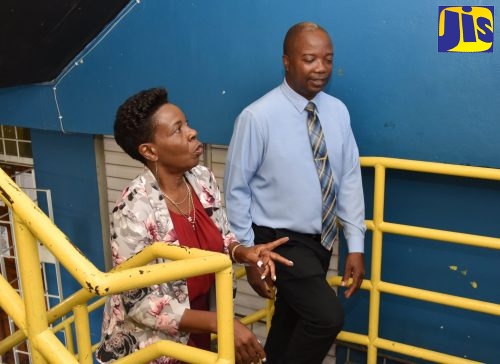Teaching of Civics Rooted at Mico Practising Primary and Junior High
By: , May 1, 2023The Full Story
The teaching of Civics is progressing well, according to stakeholders at the Mico Practising Primary and Junior High in Kingston.
These classes teach primary and secondary students their rights and obligations as law-abiding citizens in society.
Civics encourages good citizenship, greater respect for cultural integrity and nation-building, among other things.
Since January of this year, the Government mandated that all schools islandwide should include Civics education in their curriculum; however, at Mico Practising Primary and Junior High, teaching the subject never stopped.
“Everything we do in school is linked to student behaviour, and if we are teaching children how to behave, then we will get children to behave how we teach them. If we stop teaching them how to behave, then they will behave the way they are taught elsewhere,” Principal of the school, Geraldine Allen, told JIS News.
As a former Social Studies teacher with more than 30 years’ experience teaching Civics, the Educator lauded the move to reintroduce the subject in all schools.
“I felt it was a very good idea, because I was of the opinion it should never have been removed, so I was really happy when it was reintroduced. Civics is one of those things where even though it isn’t always an exam subject, it’s not something that should be taken out of any school’s curriculum,” she argued.
Ms. Allen explained that students get the opportunity to discuss their responsibility as a citizen, their parents and the Government’s responsibilities, as well as “who they will be when they become adults”.

“Students need to learn how to behave, what to expect from their Government, and what is their responsibility. Too many times we stress the rights, but we do not stress the responsibilities, and in a Civics class this is where educators get to teach young people,” she emphasised.
Currently, the institution facilitates about 800 students, which include mainly high, primary, and special education students. Of this amount, Civics is taught from grades four to nine. It is a stand-alone subject from grade five.
For students in classes lower than grade five, Ms. Allen said the subject is usually taught in one semester, because of the number of things they are expected to do.
“So, you’ll find that it is not always a stand-alone subject, but it is always integrated into social studies,” she noted.
For her part, Social Studies teacher at the school, Casey-Ann Smith, told JIS News that students respond positively to the subject, as they get the opportunity to express their opinions on various topics and issues.
She added that the subject plays a critical role in helping to preserve Jamaica’s culture and pride in self.
“The value, love and respect for the culture [have been] fading, and Civics is one such topic that will help to pull us back to the centre and also let us understand our rights and role in our democratic process,” the Educator said.
Ms. Smith further pointed out that it has the potential to reduce violence among youth.
“I think the teaching of Civics in schools will give them more guidance and educate them on how to seek help when they are in need of it, how best it can be addressed and how to insist on their rights not being infringed,” she told JIS News.
She recommends leading a large-scale campaign on Civics education and its importance, as well as introducing additional textbooks to aid in the teaching process.
Meanwhile, 10-year-old Stephen Kelly, who dreams of becoming a journalist, told JIS News that he personally enjoys these classes.

“I like that it makes you feel prouder about yourself and your culture and how it makes you feel confident in your melanin,” he added.
Stephen said he is often curious about the functionalities of the Government. “I do ask a lot of questions of my mother and my dad… and sometimes if they are not around for me to ask, I search it up online or read books about it,” he said.
He wants other students to “feel more confident about themselves, about their culture and know who they are and where we’re coming from as a people”.
The reintroduction of Civics resulted from a deep concern at the level of incivility and lack of respect for self, others, and authority that continues to be displayed across the country.
Senior Education Officer in the Curriculum Unit of the Ministry of Education and Youth, Marlon Williams, said the action is consistent with the Ministry’s Character in Education programme, which focuses on positive behaviour outcomes.
“We’re developing civic pride in our students. So, this reintroduction is really to promote positive values and attitudes, which is working together with the Character in Education programme,” he added.
Mr. Williams said that some schools may have difficulty allocating specific times to facilitate Civics education as a stand-alone subject and recommends infusing it within the Social Studies curriculum, extra lessons or other subject areas.
“In all of our subjects, we have cross-curricular links, and so you might be teaching a Maths class and there’s something in that class relevant to Civics education. We encourage teachers [to] find those things that are civically related [and] incorporating them in their lessons as well,” he added.

